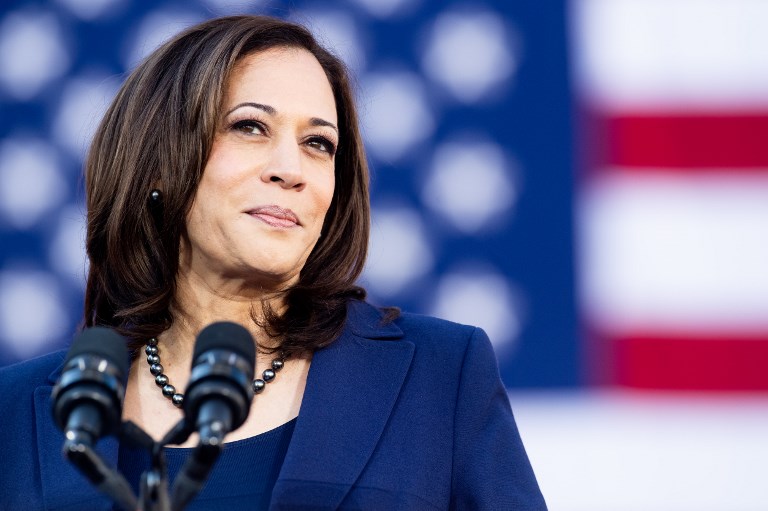
by Michael Mathes
Agence France Presse
WASHINGTON, United States (AFP) — Kamala Harris faces questions from US voters Monday as an official White House candidate, a day after the Democratic senator formally declared her 2020 bid to become America’s first black female president.
By launching her campaign early — a year before any primary votes are cast — the California lawmaker leapfrogs several party luminaries waiting in the wings, and a few already in the race, to become the de facto frontrunner.
It’s a burgeoning field that may ultimately feature dozens of candidates seeking to oust President Donald Trump.
Harris immediately took her campaign to Iowa, the state that votes first in the nominating process, holding a televised town hall from Des Moines that airs at 9:00 pm (0300 GMT Tuesday).
A crowd of more than 20,000 watched her kick off her campaign Sunday in Oakland, California.
But complicating the launch, billionaire former Starbucks chief executive Howard Schultz said hours later that he is seriously considering jumping into the race — as an independent.
The self-described “lifelong Democrat” told CBS news show “60 Minutes” that he will run as a “centrist independent outside of the two-party system.”
Not only is Trump unqualified to be president, Schultz said, but Republicans and Democrats are failing the American people by engaging daily in “revenge politics.”
Schultz’s announcement drew sharp rebukes from Democrats, who warned he would siphon off Democratic votes and clear Trump’s path to re-election.
“If he ran, it would be the best thing possible for Donald Trump,” tweeted Congressman Brendan Boyle. “I urge him, for the good of the country, to reconsider this bad idea.”
Trump, clearly aware that a Schultz run could help the sitting president, wasted little time in seeking to goad him into the race, declaring the coffee king “doesn’t have the ‘guts’ to run for President!”
But another billionaire businessman, former New York mayor Michael Bloomberg, strongly urged Schultz to halt his independent antics.
“In 2020, the great likelihood is that an independent would just split the anti-Trump vote and end up re-electing the president,” said Bloomberg, who himself considered an independent run three years ago.
“That’s a risk I refused to run in 2016 and we can’t afford to run it now.”
‘Better than this’
Harris, 54, and Schultz, 65, join several candidate already in the race, including Senator Elizabeth Warren of Massachusetts, New York’s Senator Kirsten Gillibrand, House Democrat Tulsi Gabbard of Hawaii and Obama-era housing secretary Julian Castro of Texas.
The compelling Oakland speech was a show of strength by Harris and most likely a calculated shot across the bow to those still on the 2020 sidelines, notably the four Bs mulling a run: Joe Biden, Bernie Sanders, Cory Booker and Beto O’Rourke.
Harris spoke of the “arrogance of power” demonstrated by Trump and his administration, and warned that “the American dream and our American democracy are under attack and on the line like never before.”
“We must answer a fundamental question: Who are we?” she said. “America, we are better than this.”
Harris, whose father is from Jamaica and whose mother is Indian, said that “in the face of powerful forces trying to sow hate and division among us, the truth is that as Americans, we have so much more in common than what separates us.”
One distinct advantage for Harris is the shift that her home state has made in the primary calendar.
For years, California — the nation’s most populous state — voted near the end of the process, meaning nominees were often decided before a single Californian cast a vote.
But the state has moved its primary forward, to so-called “Super Tuesday” on March 3, 2020, which would give the Golden State a dramatically more powerful say in determining the nominee.
One prominent Californian, outspoken Congressman Ted Lieu, has already endorsed Harris, describing her as “the person we need to move America forward.”
Harris is a former state attorney general. She said her platform will include several progressive policies like debt-free college and “Medicare for all,” which would allow Americans to opt into government-run health coverage.
© Agence France-Presse







